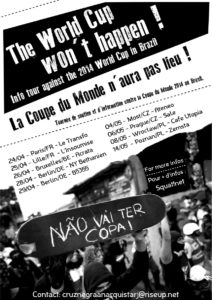An european info Tour Against the 2014 World Cup in Brazil began at the 24th May. The meaning of this tour is to present the situation in this country, to explain the social conflicts and to support the riot movements. This tour is also being organized in benefit to the “Anarchist Black Cross” Rio Janeiro, because the experiences from the last riots in Brazil and the Special Security Laws that are gonna be used during the World Cup, show us that the repression will be very high.
The tour already passed by France, Belgium, Germany and Check Republic. This week the Tour will pass in Poland. Then, we’re gonna have other dates in Germany, Switzerland and France. You can check the next tour dates on the article:
9th May – Krakow (Poland)
10th May – Cicha 4 / Lublin (Poland)
13th May – Syrena Squat / Warszawa (Poland)
14th May – Zemsta / Poznan (Poland)
28th May – Centre Culturel Autogéré / Nancy (France)
Other dates will come in Berlin (DE), Leipzig (DE), Freiburg (DE), Zurich (S), Lausanne (S) , Dijon (FR) and Amsterdam (NL).
Here down we explain the reasons why we are against the World Cup:
The reasons we are against the 2014 World Cup in Brazil:
The next World Cup is arranged to take place in Brazil in june 2014. Despite Brazil being known as “the country of football”, since few years there is a big social movement that opposes it. The reality differs from the image created by the protagonists of the World Cup circus and their colorful advertisements. In order to fulfill the FIFA standards as well as to adapt cities for tourism, local governments have started new urban projects which made the poor people excluded even more than they already were. This policy sparked many riots and had fed the growing movements in Brazil over the last few years. Even if in Brazil this phenomena is impossible to ignore, it only got attention of the international media when in june 2013 massive riots exploded in the whole country.
Despite the image that the Brazilian government is trying to create – the one of a country that’s economically successful – the social gap between classes is still really big. For the Brazilian government the 2014 World Cup and the 2016 Olympic Games are meant to be the visible results of this economical success. The authorities are trying to create an image of a modern country with a growing quality of life, steadily advancing in the atmosphere of “social peace”. The poorest populations are paying the price for this image. For these mega-events, the cities are being cleansed, poor neighborhoods pacified (they are put under military control), many of them completely destroyed for the sake of removing the poverty from the image of the city centers. The gentrification have dramatically intensified and the cost of life in the big cities got extremely high. This social context leads to a general popular dissatisfaction and causes the people to rise up. The revolt is in turn violently repressed by the authorities.
What’s the government answer to the movement?
Specially after the June 2013 uprisings, the police is violently repressing the demonstrations. They use the usual arms (tear gas, stunning grenades, rubber bullets…) and sometimes real bullets. Mass arrests happened often. The mass-media collaborated with the authorities by creating an image of the demonstrators as violent and dangerous people. Many of the people arrested during this period were charged by the National Security Laws (laws used in the time of the military dictatorship) and the laws against the “organized crime”.
At this moment, the Brazilian parliament is rushing to vote new anti-terrorists laws before the World Cup. After these new laws, it’s going to be possible to define the demonstrations as terrorists acts. They will also be able to charge under these laws for up to 20 years in prison for property destruction. Even without demonstrations, in the big cities the poor people are subjected to constant harassment by the police, often simply because of being black, poor or because of living in a favela. Military occupations, accompanied by racist violence, happen even more during international mega-events. Facing all this, the Brazilian social movements are trying to get prepared to the coming repressions during the World Cup.
Why the movement Against the World Cup needs support?
The experiences from the last riots in Brazil and the application of the Special Security Laws during the coming World Cup shows that the level of repression will be very high. In some cities, solidarity groups were formed to face that. The money raised for the movement “Against the World Cup” will be sent to the ABC (Anarchist Black Cross) Rio de Janeiro. This money will be used to pay the fines and bails, the costs of processes and the needs of people in jail. It can also be used to support the residents of the military occupied favelas and the people removed from their houses because of the World Cup project.
